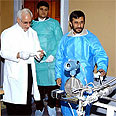
Iran says starts work on making 20% atom fuel
Atomic Energy Organization spokesman in Tehran says Islamic Republic started preparatory work on producing high-grade nuclear fuel at 0600 GMT 'in presence of IAEA representatives'. Meanwhile, China urges more talks on nuclear plans
Iran began work on Tuesday to produce higher-grade nuclear fuel for a Tehran research reactor, an official said, a move that may increase pressure for new UN sanctions due to Western fears it wants to develop atom bombs.
Tehran announced on Sunday it would produce uranium enriched to a level of 20% for a reactor making medical isotopes. This followed a failure to agree terms for a proposed nuclear fuel swap with major powers, under which it would send most of its low-enriched uranium abroad.
"We started preparatory work at 9:30 am (0600 GMT) in the presence of (International Atomic Energy Agency) representatives," a spokesman for Iran's nuclear energy agency, Ali Shirzadian, said on Tuesday.
"And it (production) will be formally announced at 1 pm by Dr Salehi," he told Reuters, referring to the head of the Iran's Atomic Energy Organization, Ali Akbar Salehi.
Iran's Arabic-language state television, al Alam, said earlier that production of 20% enriched uranium had started at the Natanz plant.
Iran currently enriches uranium to a level of 3.5% while 80% or more is needed for a nuclear bomb.
"Today we started to make 20% enriched nuclear fuel ... in the presence of IAEA inspectors," an unnamed official told al Alam.
Sanctions push
The United States and France led calls for what would be a fourth, broader set of punitive sanctions on Iran, a major crude oil producer. A senior lawmaker in Russia, which in the past has urged talks rather than punishment, also said economic measures should be considered.
Among the big powers only China, which can block any UN sanctions, has remained unswervingly opposed to punishing Iran.
Possible targets for any new sanctions include Iran's central bank, the Revolutionary Guards who Western powers say are key to Iran's nuclear program, shipping firms and its energy sector, Western diplomats say.
Analysts said Iran would need a few months to reconfigure its Natanz plant to refine uranium to higher purity.
Iran may also be having more difficulty obtaining crucial components due to UN sanctions, said the analysts, who added that the latest move might be a negotiating tactic.
Iran's plan to enrich from the 3.5% level suitable for power plant fuel to 20% would advance it much of the way to having weapons-grade uranium.
Tehran says the product is destined for the research reactor, but it lacks the technology to convert the material into special fuel needed to run this plant in the capital.
A Foreign Ministry spokesman said Tehran was still prepared to carry out the fuel swap, if its conditions were met.
On Monday, an IAEA spokeswoman confirmed Tehran had notified the UN nuclear watchdog of its plans to produce higher-grade fuel, and said it would damage chances of saving the atomic fuel supply deal between Iran and world powers.
But Foreign Ministry spokesman Ramin Mehmanparast said on Tuesday, according to state television: "We're still prepared, if our requirements are met, to carry out this swap ... any time they are ready this can be done."
China urges more talks on nuclear plans
Meanwhile, China has called for more talks in the wake of calls by other world powers for possible sanctions on Iran if it goes through with its intention to enrich uranium to higher levels.
Foreign Ministry spokesman Ma Zhaoxu refused to comment on sanctions Tuesday at a news conference, saying "I hope the relevant parties will step up efforts and push for progress in the dialogue and negotiations."
The Associated Press contributed to this report










